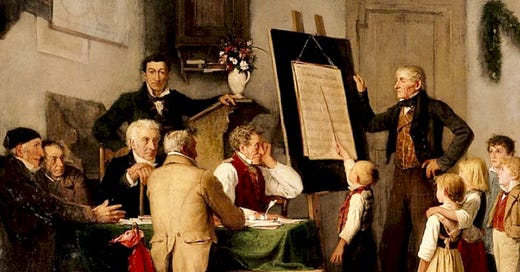Can schools cultivate moral values and relational skills?
Colleges as monasteries, moral formation in a time of moral pluralism, and the Making Caring Common Project
We don’t precisely know the average age of Connective Tissue readership, but our guess is that this week, we’re asking most of you to turn back the clock to your school days (cue Billy Madison).
While the media is rife with stories of crises in higher education and K-12 schools (and for good reason), there are green shoots, too. So, this week, we’re highlighting the promise—and potential perils—of educational environments in helping young people develop a moral foundation, cultivate relational skills, and care for the common good. Here are a few questions we’ll explore:
What would it take for universities to return to their roots and help students cultivate their ultimate values, attentional skills, and meaning in life?
How can schools help men develop the relational skills that they need (and seem to be lacking) in today’s increasingly gender-egalitarian world?
Can young people be morally formed and educated in a society defined by moral pluralism?
How is Harvard’s Making Caring Common Project attempting to prepare young people to care about others and the common good?
Pack your lunch box, strap on your backpack (or grab your rolling backpack if you are that type of kid), and don’t be late for the bus. Your homework for the weekend is to enjoy some of these articles.
Thanks for your support. And, as always, let us know what you think.
- Eric, Sam, & David
The Reads
New York Times - “Why Universities Should Be More Like Monasteries” by Molly Worthen (May 2023)
“We need an intervention … selectively returning to the university’s roots in the monastic schools of medieval Europe and rekindling the old-fashioned quest for meaning.”
In the face of technological creep into all facets of university life, Dr. Worthen presents a radical solution: colleges should offer “a secular monastery within the modern university, with a curated set of courses that ban glowing rectangles of any kind from the classroom.” To bring her point to life, the author highlights several courses inspired by monastic living that are consistently on college campuses. At the University of Pennsylvania, for example, Professor Justin McDaniel teaches “Living Deliberately,” which asks students to adopt the practices of monastic traditions, including a one-month vow of silence and fast from technology. Worthen argues that these courses stress what colleges should focus on most: helping students unearth their ultimate values and cultivate the skills of attention so that they can navigate life with moral clarity and intention.
Of Boys and Men Newsletter - “How men can be invaluable at the dance” by Richard Reeves (March 2024)
“If the dance is now the dance of more equal marriages, more engaged parenting and higher-EQ workplaces, us guys do indeed need to make sure we are invaluable in all those spaces.”
Quoting the first headmaster of one of England’s private all-boys’ schools, Reeves argues that contemporary men need to be as invaluable “at the dance” as they are “in a shipwreck.” And what does it look like to be invaluable at today’s version of the dance? To Reeves, it’s all about relational skills—the kind of skills that make you a good life partner, a good co-parent, a good friend, and a good co-worker. He talks about the rising importance of these skills in a more gender-egalitarian world, particularly as they relate to the increasingly class-divided construct of marriage. And, interestingly, he makes the case that single-sex schools might be the best places to cultivate these relational skills in young men. His case, which he admits to being untested, is that without girls and women around, boys and young men would be forced to develop these crucial skills of listening, caring, and nurturing. It’s a controversial take - do you buy his argument?
The Theory
The Hedgehog Review - “The Denial of the Moral as Lived Experience” by James Davison Hunter (March 2024)
Today’s America is not defined by a particular morality grounded in “a living creed” or “lived community,” but instead a state of moral pluralism, where there are many different moral values which can be in conflict with one another. Amidst this pluralistic moral milieu, Hunter asks a thorny question: how, if at all, can young people be morally educated and formed? In tracing our history, he is hardly satisfied with where we’ve landed:
The primary institutions through which moral understanding was mediated passed from the family and local religious congregation to the public school and youth organizations, and, finally, to the ubiquitous distractions of pop culture and social media. It is hardly surprising that all of these changes yielded a transformation in the purpose of moral formation itself—from mastery over the soul in service to God and neighbor to the training of character in service to civic life to self-care and cultivation of personality for the sake of emotional and psychological well-being. From the acquisition of a sacredly grounded sense of good and evil, we have now transitioned to a regime of moral education devoted to largely emotive deliberations over a subjective sense of safety and happiness.
Hunter closes the piece with a rousing call for “a new paradigm” that addresses the “challenges of moral difference” in ways that “recover the particularities of moral language” and “moral ecosystems.” He provides the seeds of what this paradigm could look like, calling community-embedded institutions—from the YMCA, to houses of worship, to schools—to cultivate moral values like kindness, generosity, respect, and justice through the particularities of their culture and place. To Hunter, the moral formation of young people should occur not by “engineering an inclusive moral culture independent of our many differences,” but by “finding common ground through our differences.”
The Work
Making Caring Common Project - Harvard Graduate School of Education
At a moment when educational institutions are questioning whether and how they should play a role in the moral formation of young people, the Making Caring Common Project (MCC) seemingly picks up where Hunter left off, outlining an affirmatively moral vision for its work: “our vision is a world in which children learn to care about others and the common good, treat people well day to day, come to understand and seek fairness and justice, and do what is right even at times at a cost to themselves.” Based on the research of their Faculty Director, Rick Weissbourd, MCC aims to realize this vision through a few different lines of work:
Schools & Parents: Partner with schools, educators, and parents through their Caring Schools Network and Caring Families Project to help children cultivate the values and skills to be caring citizens.
College Admissions: Work with college admissions teams and guidance counselors—through trainings, guides, and campaigns—to prioritize character, concern for others, and the common good in the college admissions process.
Research & Publishing: Conducting research and publishing reports focused on helping children develop concern for others, their communities, and the common good.
You can learn more about MCC’s work by visiting their website and checking out the links above. And, if you’re interested in Professor Weissbourd’s recent work on loneliness, you should check out his op-ed and interview with Senator Chris Murphy.







